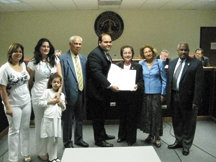When Cuban President Fidel Castro threw 75 dissidents into jail in 2003 in what is referred to as “Black Spring,” their wives and mothers did not sit idly by. They silently marched every Sunday, their white dress offset only by the gladiolas they grasped in their hands, representing strength of character, and remembrance. Their actions asked what their words could not: the release of their loved ones.
When dark clouds descended upon North Hudson last April 25, the day the local Cuban Ladies in White were to lead a walk down Bergenline Avenue in solidarity with their sisters in Cuba, the ladies ignored the harsh conditions and pressed on.
Five thousand white-clad supporters, with pink gladiolas in hand, joined them in the march, calling for freedom for the Cuban political prisoners and for respect for human rights, with two important guests among them: Black Spring victim Nelson Aguiar and his wife, the co-founder of the Cuban Ladies in White, Dolia Leal.
“The more they [held the Ladies in White down], the more they rose against them.” – Mirta Cairo.
________
NACAW is a non-profit organization based in Union City that provides services to minority women all across the United States.
A woman of strength
The award was instituted by NACAW in memory of Elena Mederos (1900-1981), acknowledged as the most prominent Cuban lady of the 20th century for her contributions to women’s rights and social work both here and in her native Cuba.
Prior to Fidel Castro assuming the presidency, Mederos prolifically advocated social work on a national level, helped set up the school of Social Work at the University of Havana, and was named the first Minister of Social Work in Cuba.
This year’s Elena Mederos Award recipients have a particularly close connection to Mederos, who spent most of her life in the United States trying to free her political prisoner nephew and others like him.
NACAW has presented the award since 1992, and has always held the ceremony in March, in honor of Women’s History Month.
Political prisoners in Cuba
Last year, five local women, inspired by the Ladies in White in Cuba, conceived of an idea to initiate a local march down Bergenline Avenue.
“They march every Sunday around the church. They go through the streets of Havana, and they just ask for liberty,” said one of the organizers, Siomara Sanchez, who is also president of NACAW. “We believe that we have to support these people…that as a women’s association, we have to do this for them.”
It started small, just a shared vision among the women – Sanchez, Mirta Cairo, Ana Cueto Acosta, Georgia Romero, and Fina Farres – but picked up momentum and followers as the April 25 date drew near.
Eight years before, the Ladies in White in Cuba had gained momentum when the European press picked up on their relentless marches every Sunday and made their cause visible to the world.
People worldwide learned of the imprisonment of 75 men – journalists, librarians, human rights activists, and democracy activists – and their sentences of up to 27 years just for expressing their opinions.
As hostility toward the Castro regime mounted, Castro’s supporters spit and screamed at the women, trying to deter them and to end the bad press.
“But the more they [held the women down], the more they rose against them,” Cairo explained.
Their persistence paid off as, slowly, prisoners were released.
One of those prisoners was Aguiar, who was sentenced to 13 years, but was released on April 8, 2009.
Along with his wife, Leal, Aguiar arrived at the Newark airport last year with broken ribs and various medical issues, but with a promise of an apartment in Elizabeth and a new life.
They arrived just in time for the local Ladies in White march, their presence a symbol of hope and the power of solidarity for the crowd along Bergenline.
Cairo proudly shows a picture of her posing alongside Aguiar and Leal.
“According to Castro, they are terrorists,” she said. “They told me the picture would mark me as a terrorist. To me, it was an honor to be standing next to them.”
For those lost
One prisoner who didn’t “make it” was Orlando Zapata Tamayo, who died last February after his hunger strike in protest against the Cuban government and its treatment of prisoners.
To commemorate the one year anniversary of his death, a mass was held at Saint Rocco Church in Union City last month.
“Some say he was a simple man and we’re making too much of him,” Cairo said of Tamayo, “but he knew there was something better, that there is such a thing as a constitution and a country that has human rights.”
Another one of the 75 dissidents, Dr. Oscar Elias Biscet, who was released on March 11 along with 50 other dissidents, helped spread awareness of the abuses in a film format.
Oscar’s Cuba, a 60-minute documentary produced by In Altum Productions, has had screenings all over the United States, with a special screening recently held at the Jose Marti Freshman Academy in Union City.
“I strongly urge all to see it,” Cairo said. “It will open a lot of people’s eyes.”
For those wondering if another march is in the future, the answer is no. But the Ladies in White are in the midst of planning a mass to take place sometime next month to mark the one-year anniversary.
Upcoming for NACAW
Two months ago, NACAW held one of its most famous events, the Three Kings Day Spectacular, an annual complimentary show at the Park Theater for the less privileged children of Union City.
Coming up is the organization’s annual Easter toy donations, in which members visit the Medical Center Hospital in Jersey City, the Saint Clare Home, and the Hope House, to give a gift to a child in need.
To contact NACAW, please call (201)271-9308 or e-mail contactus@nacaw-us.org.
Deanna Cullen can be reached at dcullen@hudsonreporter.com.
